Search Results
Showing results 21 to 40 of 81
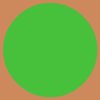
Mix-N-Match Light
Source Institutions
This is an online exhibit about color perception. Learners set a random background color and then try to mix red, blue, and green light to match.
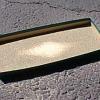
X-Ray Spectra
Source Institutions
In this activity, learners use simple materials to simulate the effect of X-rays in a safe way. Learners place a piece of window screen over a box and a cardboard pattern on top of the screen.
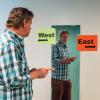
Mirror Reversal
Source Institutions
Challenge popular misconceptions, learners explore how a mirror actually reflects an image in this activity.
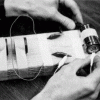
Motor Effect
Source Institutions
In this activity about electricity and magnetism, learners examine what happens when a magnet exerts a force on a current-carrying wire.
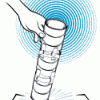
CANdemonium: Make a Drum Out of Recycled Cans
Source Institutions
With three cans and some tape, make a drum that you bonk down on any surface to produce a variety of sounds. This activity also teaches you about pitch, vibration, and frequency.

Bernoulli Levitator
Source Institutions
Demonstrate the Bernoulli Principle using simple materials on a small or large scale.
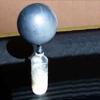
Yeast-Air Balloons
Source Institutions
In this activity, learners make a yeast-air balloon to get a better idea of what yeast can do. Learners discover that the purpose of leaveners like yeast is to produce the gas that makes bread rise.
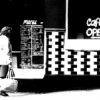
Cafe Wall Illusion
Source Institutions
In this fun and interactive online exhibit, the straight lines of a tile wall appear to curve. The learner moves the rows of tiles and changes the color of the grout to achieve the intriguing effect.
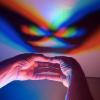
Colored Shadows
Source Institutions
In this optics activity, learners discover that not all shadows are black. Learners explore human color perception by using colored lights to make additive color mixtures.
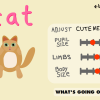
Cutify: What Makes for Cute?
Source Institutions
In this online activity exploring our perception of "cuteness," learners adjust various factors (like pupil size or length of limbs) on a face, a cat, and a hammer.
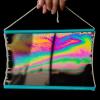
Cellular Soap Opera
Source Institutions
In this activity, learners create a large film of soap and experiment with what can and cannot pass through it.
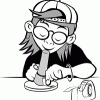
Bubbularium: See the Colors in Bubbles
Source Institutions
With little more than a flashlight, a straw, and a plastic lid, make an observatory so you can see the amazing colors in bubbles.
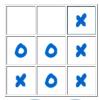
Tic-Tac-Toe
Source Institutions
In this online version of the classic paper and pencil game, learners practice looking ahead to anticipate an opponent's move.

Polar Opposites
Source Institutions
In this activity, learners make a 3-D model of magnetic fields by inserting a small, strong magnet into a sphere.
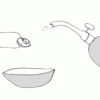
Physical Change
Source Institutions
In this activity, learners use heat to separate zinc and copper in a penny. This experiment demonstrates physical properties and how physical change (phase change) can be used to separate matter.
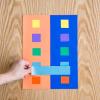
Color Contrast
Source Institutions
Do you have a hard time matching paint swatches with your furniture? When you consider human perception, color is context dependent.
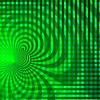
Magnetic Shielding: Magnetic lines stop here
Source Institutions
Testing magnets is always a fun pastime, but here, we're going beyond "will it attract the magnet?" In this activity, learners will investigate which materials allow magnetic fields to pass through or
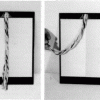
Gray Step
Source Institutions
In this activity, learners discover that it's difficult to distinguish between two different shades of gray when they aren't separated by a boundary.
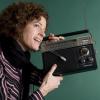
Radiohead
Source Institutions
When you teeth clatter, they make quite the racket disproportionately to how much they actually sound to someone else.
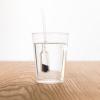
Eyedropper Hydrometer: Buoy your understanding of density
Source Institutions
Build a hydrometer (measures the density of a liquid) using a pipet or eyedropper.
